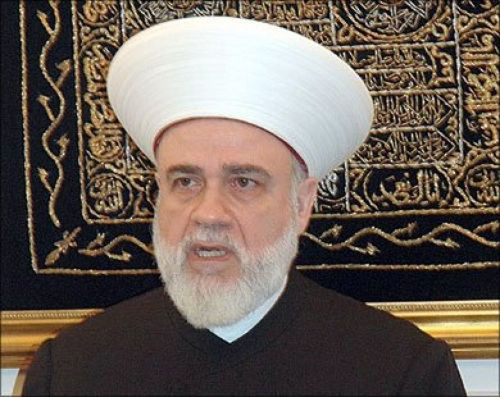
Beirut: Lebanon’s top Sunni Muslim authority on Monday issued a fatwa against moves to legalise civil marriages inside the country, where couples of different faiths have to travel abroad to tie the knot.
The religious edict came a day after President Michel Sulaiman tweeted that he would remain steadfast in supporting such unions, while Prime Minister Najeeb Mikati wrote on his Twitter account that a consensus was required to address the issue.
“Any Muslim with legal or executive authority in Lebanon who supports the legalisation of civil marriage is an apostate and outside the religion of Islam,” Grand Mufti Shaikh Mohammad Rashid Qabbani said on the website of Dar Al Fatwa, the official institution for fatwas.
“There are predators lurking among us, trying to sow the bacteria of civil marriage in Lebanon, but they should know that the religious scholars will not hesitate to do their duty and prevent the passage of such a bill. “
Qabbani said offenders would not be eligible to be buried in a Muslim cemetery.
Sulaiman, a Christian, tweeted that he would “respond to the evolution and aspirations of the people and prepare the appropriate laws for the issue of civil marriage.”
“There are authorities opposed to civil marriage, but this will not sway my convictions or my quest to put the train on the right track,” he said in another tweet.
But after meeting Sulaiman on Sunday, Mikati, a Sunni, tweeted in Arabic “the current circumstances do not allow us to address new controversial topics that create divisions.” He added in English: “I believe that the civil marriage issue cannot be dealt with from a top-down approach.”
The campaign for civil marriage in multi-faith Lebanon, which is considered a liberal Arab country in a conservative region, has gained momentum with a daring initiative to create new jurisprudence.
Kholoud Sukkariyeh and Nidal Darwish announced earlier this month they had wed as a secular couple by having their religious sects legally struck from their family registers under an article dating from the 1936 French mandate. Sulaiman has since lobbied for a civil marriage law as a “very important step in eradicating sectarianism and solidifying national unity.”
Despite a long-running campaign by civil groups, civil marriage has no legal basis in Lebanon, a country of around four million people who belong to 18 different religious communities, mainly Christian and Muslim. Former president Elias Hrawi in 1998 proposed a similar law, which gained approval from the cabinet only to be halted amid widespread opposition from the country’s religious authorities. Lebanese authorities recognise civil weddings only if they have been registered abroad, and thousands of mixed-faith couples have travelled to nearby Cyprus or Turkey to marry. Most religious faiths have their own regulations governing marriage, divorce and inheritance, and mixed Christian-Muslim weddings in Lebanon are often discouraged unless one of the potential spouses converts.
Christian religious authorities have yet to comment on the issue.












